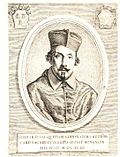1683
Lua error in package.lua at line 80: module 'Module:Ancient Olympiads' not found.
| Millennium: | 2nd millennium |
|---|---|
| Centuries: | 16th century – 17th century – 18th century |
| Decades: | 1650s 1660s 1670s – 1680s – 1690s 1700s 1710s |
| Years: | 1680 1681 1682 – 1683 – 1684 1685 1686 |
| 1683 by topic |
|---|
| Arts, history, and science |
| Countries |
|
|
| Lists of leaders |
| Birth and death categories |
| Establishments and disestablishments categories |
| Works category |
| Wikimedia Commons has media related to Lua error in Module:Commons_link at line 62: attempt to index field 'wikibase' (a nil value).. |
1683 (MDCLXXXIII) was a common year starting on Friday of the Gregorian calendar and a common year starting on Monday of the Julian calendar, the 1683rd year of the Common Era (CE) and Anno Domini (AD) designations, the 683rd year of the 2nd millennium, the 83rd year of the 17th century, and the 4th year of the 1680s decade. As of the start of 1683, the Gregorian calendar was 10 days ahead of the Julian calendar, which remained in localized use until 1923.
Events
- June 6 – The Ashmolean Museum opens as the world's first university museum.
- June 12 – The Rye House Plot to assassinate Charles II of England is discovered.
- July 8 – The Qing Dynasty Chinese admiral Shi Lang led 300 ships with 20,000 troops out of Tongshan, Fujian and sailed towards the Kingdom of Tungning, in modern-day Taiwan and the Pescadores in order to quell the kingdom in the name of Qing.
- July 14 – A 140,000-man Ottoman force arrives at Vienna in June and starts to besiege the city. The siege is broken at the Battle of Vienna on September 12 with the arrival of a force of 70,000 Polish, Austrians and Germans under Polish-Lithuanian king Jan III Sobieski, whose cavalry turns their flank. Considered to be the turning point in the Ottoman Empire's fortunes.
- July 16 and July 17 – Battle of Penghu, the Qing Chinese admiral Shi Lang defeats the naval forces of Zheng Keshuang in a decisive victory.[1]
- September 5 – the Qing Chinese admiral Shi Lang receives the formal surrender of Zheng Keshuang, ushering in the collapse of the Kingdom of Tungning, which was then incorporated into the Qing Empire. Shi Lang reached Taiwan on October 3 and occupied present day Kaohsiung.
- October 6 – Germantown, Pennsylvania is founded, leading in 1983 to U.S. President Ronald Reagan declaring a 300th Year Celebration, and in 1987, it became an annual holiday, German-American Day.
- November 1 – The British crown colony of New York is subdivided into 12 counties.
- December – The River Thames freezes, allowing a frost fair to be held.
Undated
- Wild boars are hunted to extinction in Britain.
Births
- February 28 – René Antoine Ferchault de Réaumur, French scientist (died 1757)
- March 1 – Caroline of Ansbach, queen of George II of Great Britain (died 1737)
- April 3 – Mark Catesby, English naturalist (died 1749)
- June 23 – Etienne Fourmont, French orientalist (died 1745)
- September 11 – Farrukhsiyar, Mughal Emperor (died 1719)
- September 25 – Jean-Philippe Rameau, French composer (died 1764)
- October 25 – Charles FitzRoy, 2nd Duke of Grafton, British politician (died 1757)
- November 10 – King George II of Great Britain (died 1760)
- November 30 – Ludwig Andreas Graf Khevenhüller, Austrian field marshal (died 1744)
- December 19 – King Philip V of Spain (died 1746)
- December 27 – Conyers Middleton, English minister (died 1750)
Deaths
- January 21 – Anthony Ashley-Cooper, 1st Earl of Shaftesbury, British politician (born 1621)
- February 18 – Nicolaes Pieterszoon Berchem, Dutch painter (born 1620)
- March 19 – Thomas Killigrew, English dramatist (born 1612)
- March 29 – Yaoya Oshichi, a young girl burned at the stake for arson in 17th Century Japan (born 1667)
- July 10 – François-Eudes de Mézeray, French historian (born 1610)
- July 13 – Arthur Capell, 1st Earl of Essex, English statesman (born 1631)
- July 30 – Marie-Thérèse, first wife of Louis XIV of France (born 1638)
- August 18 – Charles Hart, English actor (born 1625)
- August 24 – John Owen, English non-conformist theologian (born 1616)
- September 6 – Jean-Baptiste Colbert, French minister of finance (born 1619)
- September 12 – King Afonso VI of Portugal (born 1643)
- October 25 – William Scroggs, lord chief justice of England (born c.1623)
- December 7 – John Oldham, English poet died from smallpox (born 1653)
- December 7 – Algernon Sydney, English politician (born 1623)
- December 15 – Izaak Walton, English writer (born 1593)
1683 Media
September 12: European armies turn back Ottoman Empire's attempt to conquer Central Europe in Battle of Vienna (painting by Frans Geffels prior to 1694)
References
- ↑ China Goes to Sea: Maritime Transformation in Comparative Historical Perspective, eds. Andrew Erickson; Lyle Goldstein (Annapolis, MD: Naval Institute Press: China Maritime Studies Institute, 2009), p. 272




